
- Sarah Arnoff
- Deloris Ahmet
Fire! Brimstone! Router connectivity issues? If you're thinking satanists are greasy haired, black-clad juvenile delinquents, you're way off. The bunch interviewed here at least are more likely to work in your IT department or attend city council meetings than to waste their Saturday nights sacrificing cats and summoning demons.
A witch and warlock from the Church of Satan ("the first above-ground organization in history openly dedicated to the acceptance of Man's true nature"), along with five members of The Satanic Temple explain their religious beliefs in the following pages. What they both have in common is that neither group actually believes in Satan—or God for that matter. What they don't have in common is anything else.
The Satanic Temple is basically a political activist group hell-bent on protecting civil liberties. According to its website, their mission is "to encourage benevolence and empathy among all people, reject tyrannical authority, advocate practical common sense and justice and be directed by the human conscience to undertake noble pursuits guided by the individual will." Founded in 2012, the organization has 20 chapters throughout the country. Members' beliefs follow seven basic tenets, which outline principles on justice, compassion, scientific understanding, respect and personal freedom. The now disbanded Utah chapter was behind the After School Satan Club, which challenged the use of public schools by Christian groups.
The Church of Satan was founded in 1966 by San Francisco-based musician, author and occultist Anton Szandor LaVey. The organization sees Satan as representing pride, individualism and enlightenment. They accept humans' true nature, and encourage self-indulgence and carnality. Members worship themselves rather than God. Along with The Satanic Bible and Eleven Satanic Rules of the Earth, the church abides by nine sins—the cardinal one being "stupidity."
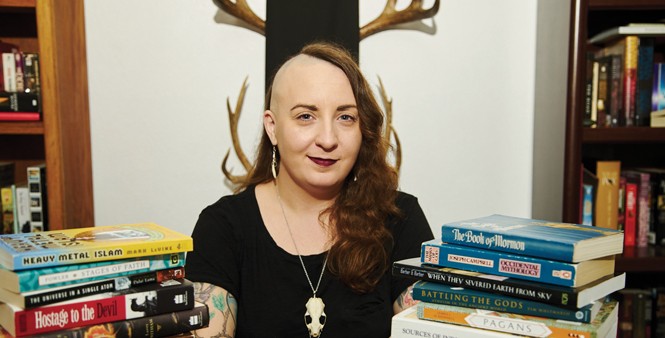
- Sarah Arnoff
Megan Kennedy
"There is usually a lot of surprise, amusement and sometimes disgust when you share with people that you're either atheist or satanist," says Kennedy, a published writer, event photographer, artist and self-described workaholic. Her photography and digital art is beautiful and dark. The Cottonwood Heights resident spends her free time playing video games, exploring graveyards, reading, camping and dispelling misconceptions.
"Our culture is severely lacking on religious education and respect for the concept of pluralism. Even people who don't 'believe in the devil' will be visibly uncomfortable that I've chosen to align myself with symbols and mythology that has historically been labeled as 'evil' or 'immoral,'" she says. "Most of the time, though, people are curious and kind even if they don't agree with the choice, and this is especially true once you introduce them to the realities of The Satanic Temple and the work they've done thus far to protect civil liberties."
Fascinated by the work of The Satanic Temple, Kennedy reached out to the head of the now-disbanded Utah chapter with her idea of a free lecture series. "The Satanic Temple's Seven Tenets coincide beautifully with the goals of the Religious Education Series," she says. "I knew we could work together to help affect cultural change, and luckily they agreed." The series of free lectures explores everything from demon possession to deconstructing religion's role in extremism.
"I've studied religion and myth most of my life, and there is a major failure in our culture regarding understanding things like historical context and the ways religion truly affects us," she says. "I'm doing my best to combat that by introducing the public to research that often doesn't reach them thanks to the gatekeeping of academia."
Her explanation of satanism is simple: "For me and The Satanic Temple, a satanist is someone who doesn't recognize divine authority," she points out. "We embrace rationality, personal sovereignty, critical thinking, compassion and reason. We align with the mythological symbol of Satan or Lucifer in order to defy the status quo of state-sponsored Christianity and its cultural influence. Satan represents the Other, the outsider. As outsiders, we've simply taken this weapon formed against us and repurposed it into a tool to fight oppression."
For Kennedy, The Satanic Temple also represents a community. One that doesn't "sit back and critique religion just to feel superior, but actually rolled their sleeves up and did the hard work of digging out room for atheists—and everyone else—to access their rights every day," she says.
One of the temple's campaigns, for example, is the Protect Children Project, an initiative aimed to protect public school students from corporal punishment, solitary confinement, bathroom deprivation and other, similar abusive practices.
"If you're uncomfortable by the notion of satanists or atheists or The Satanic Temple, I implore you to do your research, come to a Religious Education talk, and actually learn what we're about," Kennedy says. "We are real people suffering real cultural oppression who have chosen to employ the mythology of our oppressors to get the work done. And we aren't just fighting for ourselves—we're fighting to make sure you have room to live your life, too."
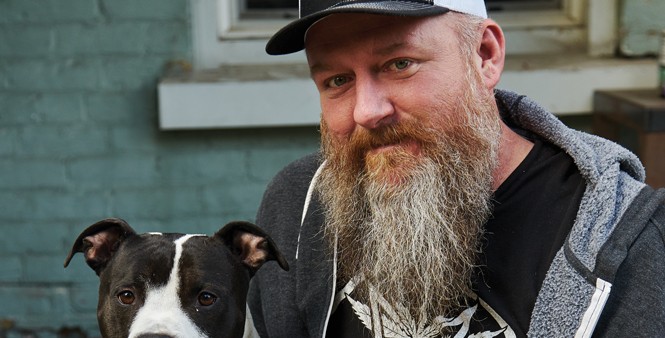
- Sarah Arnoff
Jason Stock
Stock is the brewmaster at one of Utah's popular breweries. He's a family man who loves to cook. His Instagram feed is filled with pictures of dishes he's made along with images of his family and pets. "I'm passionate about compassion and empathy," he says. "I'd like to see more people focus on being nice to each other ... I'm driven by trying to take care of my loved ones."
He's also a card-carrying member of The Satanic Temple. "Obviously most people are going to associate it with a worship of a literal guy named Satan. Personally, I'm an atheist," he asserts. "I don't believe in any god ... including the supposed character, Satan. To me, a satanist is somebody who rebels against the negative aspects of our dominant culture, and who opposes religious oppression."
He says he was hesitant to to join The Satanic Temple at first, saying their "imagery was off-putting to some." But after reading their guiding tenets, he changed his mind. "I'd never found an organization whose guiding principles so closely aligned with my own personal principles. I like knowing that I'm part of an organization that works to keep the wall separating church and state strong. I believe very strongly in the separation of church and state."
He now calls himself a satanist to confront hypocrisy in other religious beliefs.
"I believe we, as a country, have a long way to go and I wanted to support an organization that helps point out how ridiculous the encroachment of religion into public life is. I think, and hope, that when The Satanic Temple asks for the same privileges that majority religions enjoy in our country, that it sheds a light on how inappropriate it is to mix religion with government."
When asked how being a satanist affects his daily life, he says, "The Seven Tenets of The Satanic Temple are basically a reflection of how I already feel and try to live. But to be honest, I don't think about it much day to day."

- Sarah Arnoff
Kyle Steenblik
"Satanism is probably not what you think it is," Steenblik says. "It is not evil, dark or cruel. I've found it to be freeing and filled with loving acceptance."
The Atheists of Utah vice-president is swift to point out that satanism is not one-size-fits-all. "There are about as many different kinds of satanist as there are Christians," the Kaysville resident says, "but there are two basic categories: theistic satanism and atheistic satanism. I am an atheistic satanist. I align with the tenants of The Satanic Temple, which emphasizes personal accountability and empathy."
Steenblik was raised Mormon, but acknowledges he's always been an Atheist deep down. He says his "firebrand activism" with Atheists of Utah is a driving force in his life, and that he strongly believes that standing up to inequality and injustice will make the world a better place for his children.
So, when he discovered his personal beliefs aligned with those of The Satanic Temple, he didn't hesitate to call himself a satanist. Steenblik admits that mentioning his affiliation has "started conversations or ended them. Where it has abruptly ended, I've found it is usually [with] someone whom I'd never agree, so in that respect it saves time." Otherwise, he says, the conversations have been mostly positive and constructive. "It's a terrific conversation starter."
Living in Davis County with his wife of 12 years and two children, Steenblik works in IT for the Department of Defense. Along with his full-time job, carving out time to spend with his family and his work with Atheists of Utah, he's a podcaster and film critic. He's also writing a series of children's books based on bedtime stories he's told his own kids.
"I'm pretty passionate about art, the natural world, science and discovery, social justice, atheism and activism and comedy," he says. "These passions drive me to do what I can to make things better—it's a drive that has gotten stronger as my children age. If I can make any impact for them, my hope is that it will be for the better. Whether that is through standing up to inequality, injustice or by adding a little laughter or a good story."
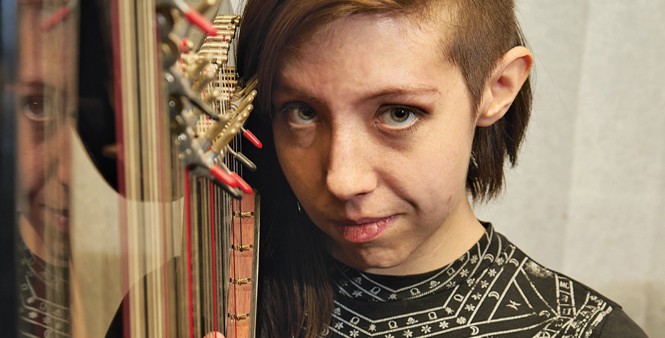
- Sarah Arnoff
Dolores Ahmet
"If you want to truly think for yourself, you have to listen more than you talk," fellow Satanic Temple member Ahmet says. "If your knee-jerk reaction to the term 'satanism' is fear and revulsion, maybe you could use some of our values. Listen to us, and you'll learn that we aren't that scary."
Ahmet works as a professional software developer and musician. She's an avid reader, devouring books on science and philosophy in her spare time.
"Satanism has its schisms like any religion, but in concept, it's an ideology that places the highest value on questioning authority and thinking for yourself," she explains. "According to literature and mythology, Satan was the one who was willing to question God—and if being literally God doesn't exempt you from having to explain yourself, why let any earthly authority get away with 'because I said so?'"
She believes harmonious rebellion is a societal building block, and that you can come to the same conclusion as society, "but you should do so because you've interrogated your own values and decided you agree," she says. "I agree that murder, theft and rape should not be allowed, that children should go to school, and that we shouldn't have lead in our water supplies, among many other things."
That intentionality, Ahmet says, is what drew her to The Satanic Temple.
"Satanism, especially the Seven Tenets of The Satanic Temple, influences a lot of my day-to-day behavior. I look for new information to try and understand the world better; I read constantly and try to get others' perspectives; I donate to charity ... I'm a vegetarian. I'm not trolling," she says. "Satanism is my sincere, deeply held religion and it helps me become a better person according to my own standards of compassion and evidence-based activism."
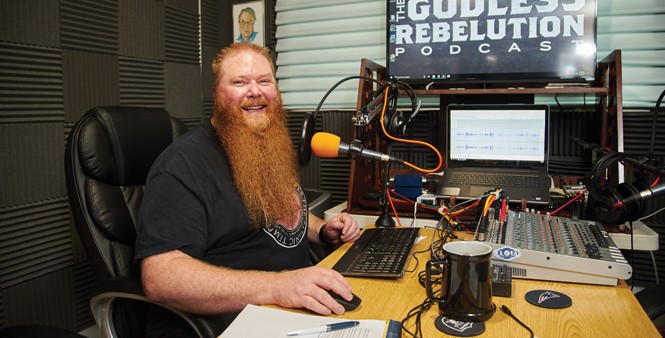
- Sarah Arnoff
Dan Ellis
Murray-based Ellis loves living in Utah. "How many other places on the globe exist where you can go golfing in the morning and skiing in the afternoon?" he muses. Ellis describes himself as the "problem child" in Sunday school who asked too many questions. Like Steenblik, he was raised LDS and was wary of its doctrine. "God told a man who was already hundreds of years old to build a boat and gather animals from across the globe so God could flood the planet and kill everything else?" he asks. "God killed all the women and babies by torturously drowning them? Seriously? And this is supposed to be a good thing? Also, what happened to the dinosaurs? Mormonism just piles layers of crazy on top of all of the other ridiculous claims found in more mainstream Christianity."
Working as an IT specialist for the IRS, his free time is spent golfing and "arguing with people on the internet." An avid reader, Ellis strives to better understand his place in the world, and figure out how he can help others. He also co-hosts the podcast Godless Rebelution, is the secretary for Atheists of Utah and regional director for the American Atheists.
"For me, the concept of Satan and satanism is a rejection of arbitrary authority in that I am free to do that which aligns with our best, most accurate and most current reasoning," he says. "I am not a slave who is told that I must believe in nonsense like talking snakes, talking donkeys, dragons, talking and burning bushes and a universe that is only around 10,000 years old or face eternal torture."
Ellis aligns himself with the tenets and activism of The Satanic Temple, but insists that his thoughts on satanism as a philosophy are his own.
"The Satanic Temple does not want mindless automatons carrying out their bidding. They encourage freedom of thought and independence. Try finding that in any other religion," he says. "The beauty and attraction of satanism, for me anyway, is that there is no single way to define what it is or what it means for its adherents, though my personal beliefs, attitudes and opinions very much align with those of The Satanic Temple."
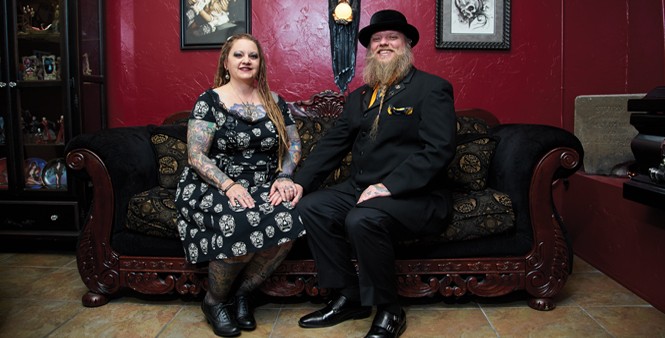
- Sarah Arnoff
Renee and A.W. "Storm" Anderson
The Andersons are proud members of the Church of Satan, and have earned the title of witch and warlock, respectively, within the church. The married couple owns a Magna tattoo shop, Art on You Studios, and has also organized the popular Halloween in Summer Festival—a celebration of all things spooky. Renee is currently the president of Magna Town Council, and Storm is the president of the Magna Chamber of Commerce. Together they have three daughters and one granddaughter.
Renee loves spending time with her family, especially her granddaughter. Storm describes himself as a "born artist and satanist." He's passionate about spending time with his "queen" and loves art, horror, books, swimming and Halloween. "I also enjoy carnal indulgences," he says. "What drives me is the pursuit of my goals," which include customizing the couple's ultimate dream home, sound long-term financial planning and regular traveling.
When it comes to satanism, the Andersons are not shy. "We are open satanists," Renee says. "We opened our tattoo shop while being very open about who we are. I was elected president of the Magna Town Council while being very open about the philosophies that we follow."
While he says he doesn't "announce it from the mountain tops," Storm says he's open about his affiliation. "Most are aware of it. I do believe that by living the philosophy in my day-to-day life, I'm happier and more fulfilled than the average person," he says.
As upstanding members of their community, the couple rarely comes across someone who is offended by their religion. "There are a few out there who shy away from us, but it has never adversely affected who we are and how we handle our business," Renee says, adding, "Satanists are certainly not normal people—far from it. We fight for what we want out of life and don't ever give up."
The couple, it turns out, pursued satanism together a little over a decade ago after reading the collected works of Anton LaVey, founder of the Church of Satan. "Since that time, my queen and I have both become active members and have been elevated to witch and warlock," Storm says.
Organized religion never made sense to Renee, who has always thought of herself as a satanist. When she first read LaVey's The Satanic Bible, she had an epiphany. "I was reading a book that had said everything I already thought," she recalls. "I had grown up believing that there certainly must have been something wrong with me to think outside the box, especially since I live in Utah."
Renee defines her beliefs succinctly, "A Church of Satan satanist is someone who is alien elite, someone who constantly pushes his or herself to reach their maximum potential, someone who will indulge instead of abstain. We are responsible members of society. We live by the philosophy of 'if it is to be, it is up to me.'"
"Alien elite," Storm says, "means we have utilized our elite attributes and risen above the common, consumer culture, and are now alien to it." He further underscores their beliefs by clarifying they "don't acknowledge an afterlife, the supernatural, and find the idea of a 'creator' to be highly unlikely."
"We believe in carnal indulgences, as responsible adults, of course—from fine wines to fleshy pleasures," he continues. The Church of Satan does not require its members to call themselves satanists, and, Storm says, "I personally don't recognize other so-called 'satanists.'"
At the end of the day, Storm stresses, satanists are people, too. "We don't seek acceptance. We're not out to recruit or engage in socio-political activity to garner unwarranted and undeserved media attention. Members of The Church of Satan strive to meet their greatest potential in all they do and frequently succeed at it. We are movers and shakers, and our membership includes community leaders, Emmy award winners, executives, accomplished authors, musicians and artists."
"The one thing I want people to take away from this interview is we do live among you," Renee adds. "We are the neighbors that keep our lawns mowed. We are the business next door to you that pays our taxes and gives back to the community. We are the parents of the honor roll students. We are the people that hold our heads high and are proud of who we are."